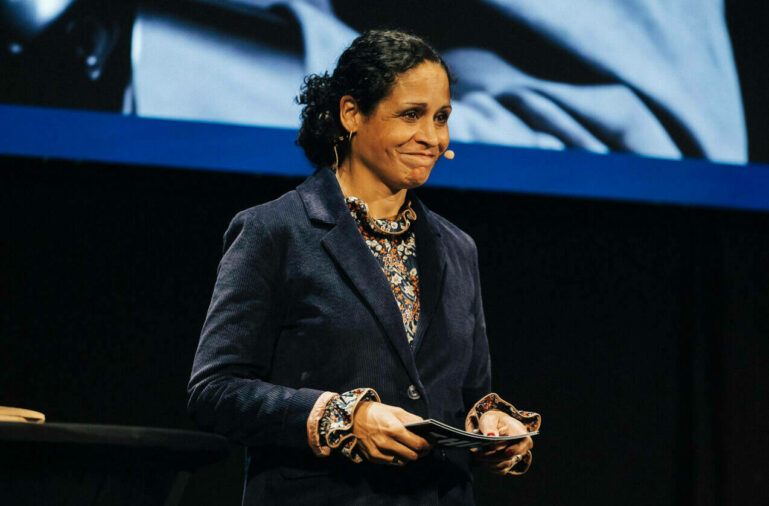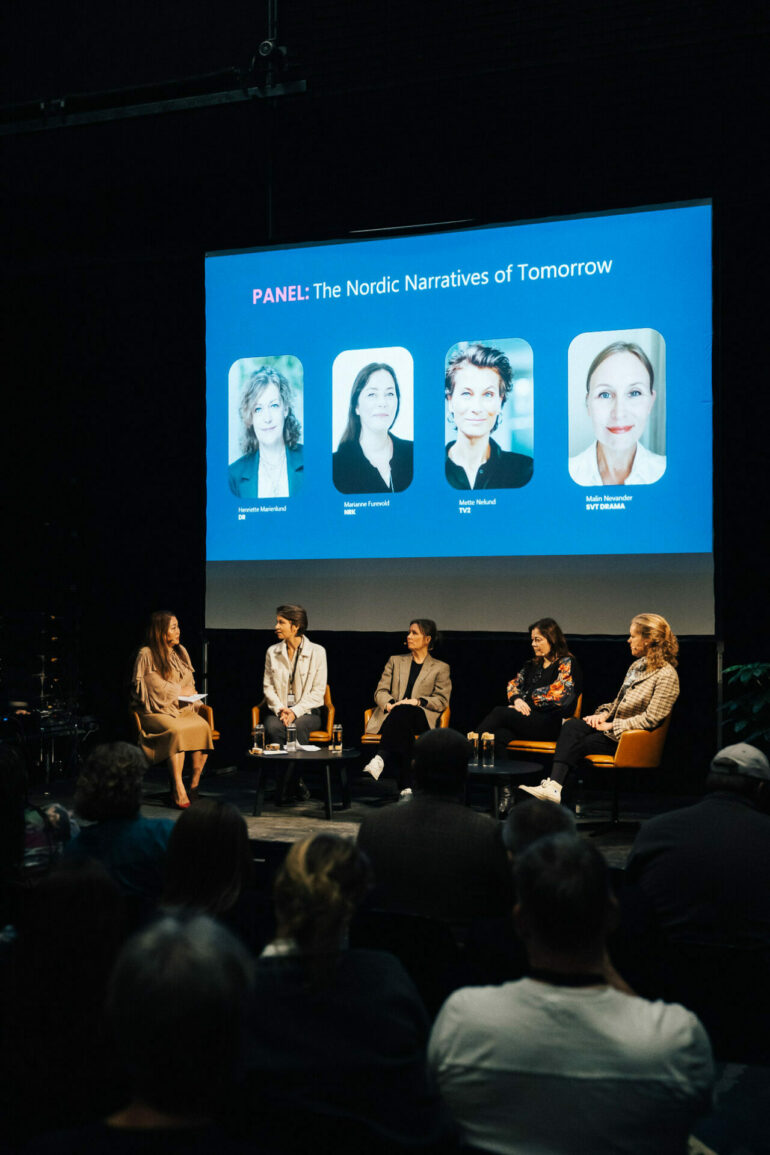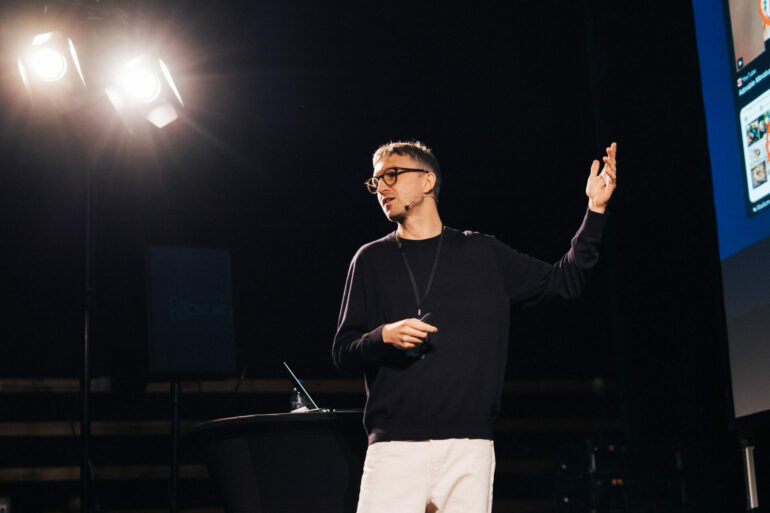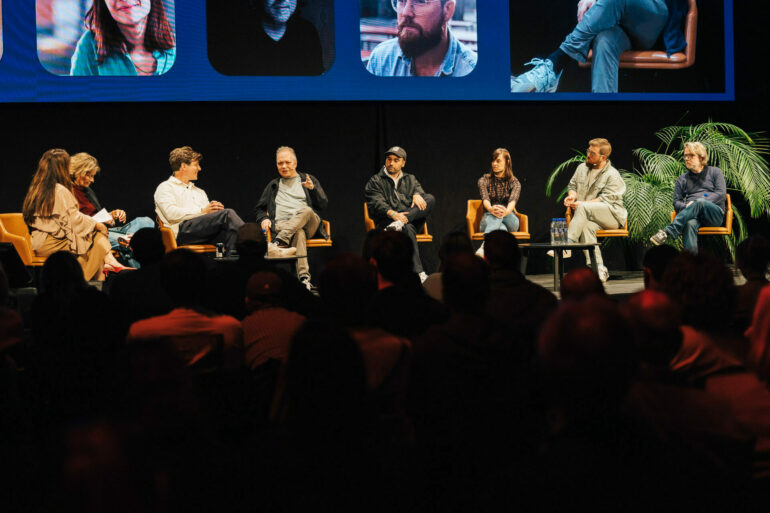WRITTEN BY: Per Laursen
THIS SERIES invited the industry to rethink its relationship with technology and get up to speed on commissioning public service and other future content.
The TV industry must navigate the changing landscape wisely and ethically, and ultimately coexist with new technology, including AI. That prelude set the scene for the “Making Friends with Technology” theme at the 6th edition of the THIS CONFERENCE, attended by Nordisk Film & TV Fond (NFTVF), held on October 31st at the Filmby Aarhus venue in Denmark.
“The theme addressed the urgent need to co-exist with the digital forces thoughtfully. We aimed to rethink our relationship with technology, navigate its biases purposefully, and explore how we can stay meaningfully connected in an increasingly digitalised world,” executive director Felicia Elisabeth Jackson, told NFTVF, adding:
“The future of media is young, inclusive, and tech-driven. To embrace the future, we must approach today’s media landscape with ethical integrity and curiosity.”
THIS SERIES invited the Nordic media industry to discuss streaming, scripted TV, games, film, immersive technologies, etc. To accommodate this year’s theme, the programme followed two parallel tracks – “tech” and “‘creative” – in 13 sessions, which in track one invited participants to rethink interactions with technology - or follow track two for a complete update on commissioning new stories for public service TV and writing the next hit TV series. Or preferably both.
Media guru and TV expert Keld Reinicke boldly opened the “creative” track by recommending that public service media better get to work on redefining their strategies.
Reinicke referred to the BBC’s head of drama Lindsay Salt, who proclaimed that pubcasters must get ready for a new role.
“Her point was that the BBC is the only place that promises boldness and braveness in decision-making. So, in an era of cautious commissioning, it’s BBC’s time to shine,” Reinicke said.
“Pubcasters are supposed to deliver what others can't, but they can't possibly do it all. That’s why it is time to redefine the role of public service,” Reinicke said. He also suggested a different pubcaster approach to rights to assist the private sector, and to rethink the issue of presence on platforms.
Reinicke went on to suggest that Nordic broadcasters explore the new trend of making TV’s IP stronger by offering more involvement - a so-called “immersive experience”. For example, the Bridgerton series that has evolved into party formats, food shows that can develop into a restaurant, or series that morph into gaming universes.
“I expect that some series, also in the Nordics, will include gaming potential in the script phase.”
Head of SVT Drama Malin Nevander, Head of Fiction Henriette Marienlund, DR, Head of Drama Marianne Furevold, NRK, and Head of Fiction Mette Nelund, TV 2 Denmark, took the stage at THIS to discuss which narratives pubcasters are looking for entering 2025.
It is hardly news that Scandi pubcasters seek original stories as they consider which new series will resonate with audiences, and which projects they eventually could greenlight for future slates, and the four executives were quite clear:
“NRK wants you to pitch one story idea you want to create – not what you think NRK wants, because our mission as a pubcaster is not to construct generic content,” Marianne Furevold said.
SVT likes new story ideas with creativity and hope, and suggests abandoning set formats when pitching new stories. The pubcaster is not a fan of rigorously dividing drama into genres when reviewing pitches.
“New stories can emerge from classic genres, and we may discover the potential in a classic crime story if we give the story a new twist,” Malin Nevander said.
At TV 2 Denmark, Mette Neelund is focused on cementing TV 2's position with mainstream stories that appeal to many Danes. TV 2 will be looking for engaging stories about somebody, not about something, while making sure that projects fit the TV 2 brand.
Originality is high on DR’s list for upcoming projects, Marienlund said, and submitted the NRK series Whisky on the Rocks as a good example; it mixes world politics, conflict and humour.
”A very original story, easy to greenlight, but harder to do,” Marienlund said.
All four Nordic pubcasters asked for original story ideas for future slates, but that doesn’t rule out diving into existing viewer data when considering pitches.
SVT takes a deep dive into data before making decisions.
“You need your own ‘algorithm’ in your head based on collected data when developing new projects. What worked and what didn’t, which target groups did we reach or miss? Or what series worked well on broadcast, but failed on Play?” Nevander said.
Times are changing – they always do. How can production companies survive the post-boom phase? THIS SERIES posed this question to Louise Vesth, producer at Zentropa, Stine Meldgaard, producer at SAM Productions, Anna Porse Nielsen, CEO at Producentforeningen, Piv Bernth, founder and producer at Apple Tree Productions, Morten Rasmussen, producer at Deluca Film, and Stinna Lassen, partner, CEO, producer at Uma Film.
What can be done to steer the industry through turbulent times, and is there a silver lining hidden amidst the uncertainty? Eleven months ago, the industry thought that in 2024 or at least 2025, the production output would surely be back on track, but maybe not. The market has stabilised.
“Don’t forget the world we live in, with wars and inflation which set off cutbacks in all businesses across the world, including our industry, and even Disney. There are fewer buyers, and they are overwhelmed with potential projects. It’s plain and simple, it’s a buyer’s market,” Piv Bernth said, adding an insightful reminder:
“Some years back, Nordic drama reached the whole world. ‘Wow,’ they said, ‘what is this?’ But the momentum is long gone, we are just part of the market, not the exciting new thing we once were,“ Bernth said.
“Players in small markets have learned a lesson the past years: If we base our business model solely on global players which are strictly business, we can be sure that we – and they – are not here tomorrow. That said, we must become incredibly adaptable, and accept that what works today doesn't work next year,” Louise Vesth said.
Despite the slightly gloomy premise, the production companies had positive takeaways for the industry.
“We have a wealth of young, experienced talents available after the boom years. So in terms of content, we are good. I sincerely hope many of them can make a living in the business,” Stinna Lassen said.
Looking ahead, Piv Bernth has grown to appreciate the dynamics of the smaller market, where a constructive dialogue between production companies during difficult years is possible.
“We can just call each other and seek advice or get help to solve a problem.”
THIS SERIES featured two sessions specifically on how AI affects business and creativity, in order to highlight both the opportunities and address the challenges and ethical considerations.
Filmmaker Jeppe Lange, who has been integrating AI into his creative process since 2019, invited attendees into the world of AI-powered film production to discuss how AI is opening new storytelling possibilities and challenging traditional filmmaking techniques.
“Things are moving and picking up. I predict that we will live through the development of our past film history in the coming ten years,” Lange said, introducing one mindboggling idea after another.
“Creatively, I forecast changes such as productions moving much faster from initial idea to production and into distribution. Leaving script writing and development to AI. The risk, of course, is more generic crap.”
Jeppe Lange’s advice on AI was: ”Be open, but critical. And curious, yet reflective.”
Partner and Head of Strategic Foresight at Manyone, Nicolas Arroyo, took a broader view. He spoke on how AI is fundamentally reshaping the business landscape, and he explored how AI-driven foresight empowers creativity, collaboration, and future-focused strategies.
Arroyo shared his reflections on what really matters when collaborating with AI in Insight, Foresight and Strategy processes, and how we can be more intentional with the use of the new tools we have at hand nowadays.
On the creative menu, “Inside the Writer’s Room” was the main dish. The panel discussion featured influential screenwriters including Thomas Vinterberg and Bo Hr. Hansen who wrote the climate-drama Families Like Ours(Familier som vores). Also on stage were Milad Avaz (STHLM Blackout, 2024), Jenny Lund Madsen (Off the Record) (Graverne, 2024), Jesper Fink (Ungeren, 2024), Dorte Warnøe Høgh (Upcoming release), and Nikolaj Feifer (Baby Fever 2) (Skruk 2, 2024).
The screenwriters took a deep dive into their craft, finding new ideas and turning them into usable scripts.
“Keep writing and practising the craft,” STHLM Blackout creator Milad Avaz said, revealing that he watched a YouTube video on how to write a script in 100 hours, and then did it. After some work, it became STHLM Blackout.
“As a scriptwriter starting out, just write. Be confident, and take on any pitch opportunity that comes along. It is a craft more than art. Practise the craft as much as you can,” Milad Avaz, a business graduate, said.
“Scriptwriting is indeed a craft that requires a certain personal energy that keeps you going no matter what happens around you. Ten per cent of what you write makes it to the screen, but that is not necessarily a bad thing. Hopefully, the ten per cent are the best ideas,” Jenny Lund Madsen said.
Many commissioners look for serial potential even in the first pitch, which opened the issue of the tough number two. Nikolaj Feier wrote Baby Fever 2, and faced the daunting question: Is there anything left in this story?
“You put everything you’ve got in the first season, and you can’t ‘save’ thirty per cent of the good stuff for a second season that may never happen. With Baby Fever, we faced the issue: The woman had the baby in season 1 – now what?” Feier said.
THIS Series is funded by City of Aarhus, Den Vestdanske Filmpulje, Danish Film Institute, UBOD, PRD, Nordea Fonden, Producent Foreningen and NFTVF.



